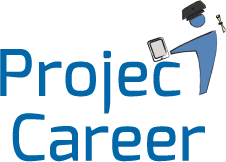Cognitive Support Technology
Cognitive Support Technologies (CST) is a cornerstone of the Project Career process. The current pantheon of apps available for smart devices can provide assistance for many academic-related cognitive difficulties experienced by students who have incurred a traumatic brain injury such as learning new materials, remembering, and scheduling. In addition, they can provide assistance in dealing with many non-academic problems such as sleep disturbances, headaches, and stress.
Once a student is enrolled into the Project Career program at any of the three implementation sites, the Technology and Employment Coordinator (TEC) at that site (Kent State University, Boston University, and West Virginia University) conducts an extensive evaluation to determine specific academic and non-academic needs. These needs can include taking notes in class, scheduling classes, completing assignments on time, dealing with sleep disruptions, etc. Once an initial selection of apps has been made to meet the student's needs, the TEC downloads these onto an iPad for the student provided by Project Career. The TEC makes any needed modifications to the iPad settings to accommodate the student and tests to ensure all apps function as desired.
The iPad becomes a focal point in student participation in Project Career throughout their higher education process. While Project Career provides each student with an iPad, there are numerous other devices that could be used to the same purpose. Almost any tablet or laptop computer will work. The key feature is mobility. Smart phones can be used, but the small screen size may be problemmatic in reading text documents and the smaller keypads can be difficult to use if the individual has any fine motor limitations. Students should feel free to choose whichever device they feel most comfortable using.
Most students who participate in the program require at least some training on the use of the iPad and/or their set of apps. This training is conducted by the TECs using a one-on-one training approach. Training continues until the student feels comfortable using the iPad and each of the selected apps.
During the academic term, the TEC and student meet on a regular basis. These meetings may be conducted either face-to-face or electronically via the iPad. During the meetings, each student is asked if they are encountering any difficulties using the device, provided apps, or accommodations. Any such problems are addressed immediately. This may be achieved through additional training, selection of alternative apps, and/or the provision of additional apps. Students also are asked if they are experiencing any difficulties (either academic or otherwise) not initially identified. Again, any new problems are assessed to determine if some form of cognitive support technology may prove useful.
Academic-related apps may be either general or course-specific. General apps are those such as scheduling and note taking apps that can be used across multiple courses and years. Course-specific apps may be applicable to one field of study (e.g., geology, social work, astronomy) or even to just one course. Oftentimes, these include foundational knowledge to which a student may refer again and again throughout their course of study. Some course-specific apps include study guides, flashcards, and formula calculators. Each student's course schedule is reviewed prior to the start of each academic term for current course-specific app needs.
